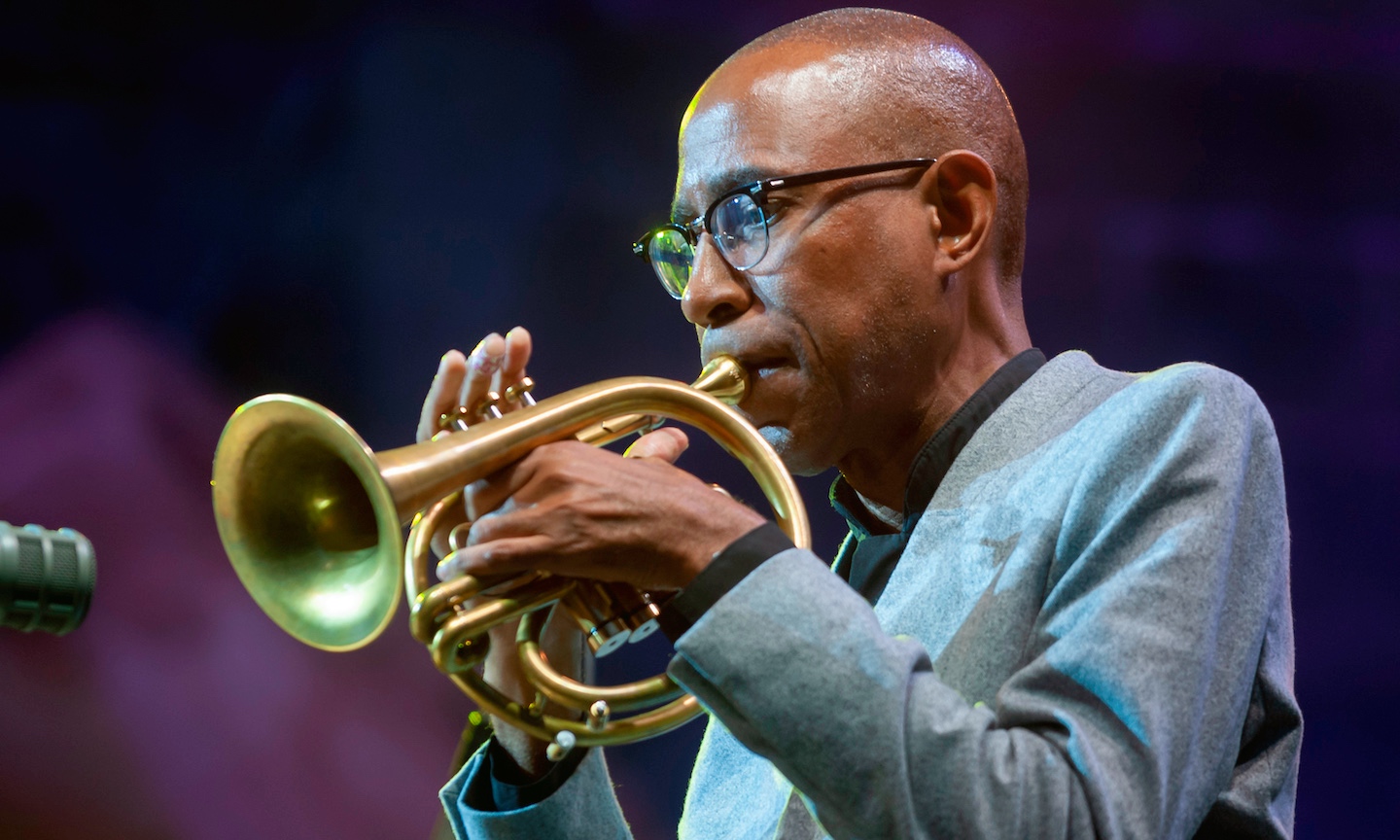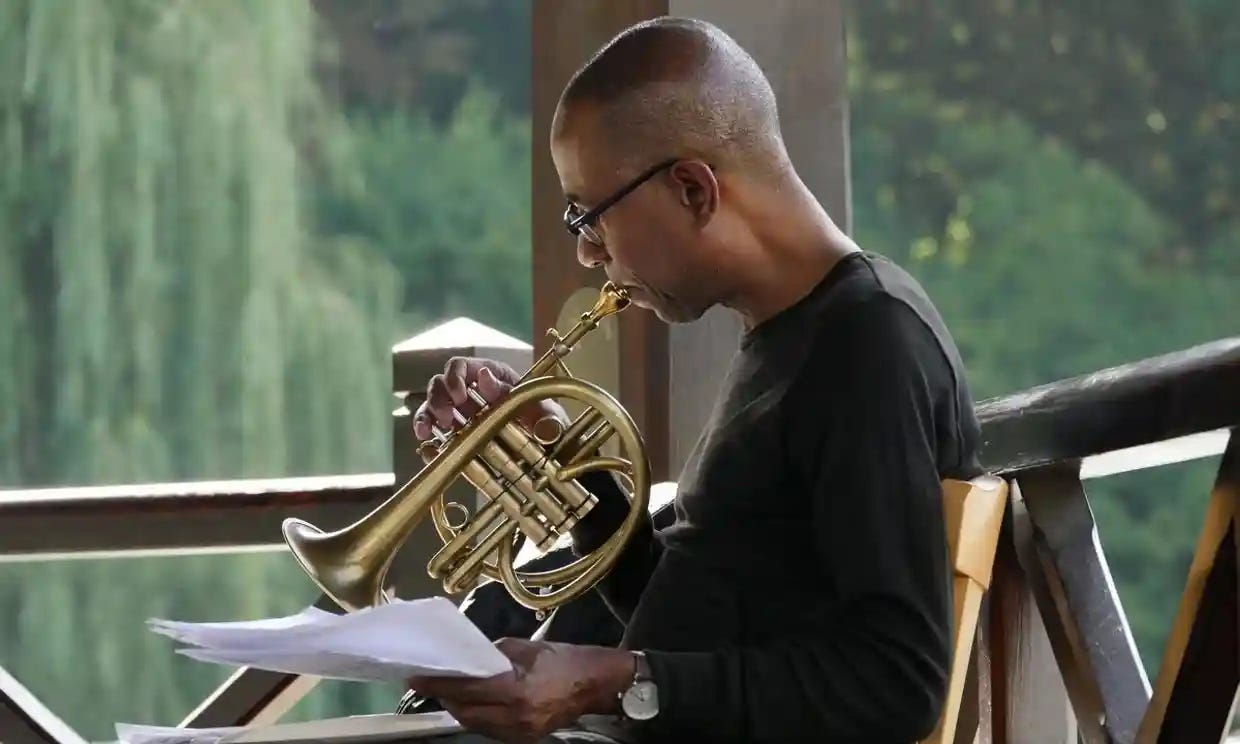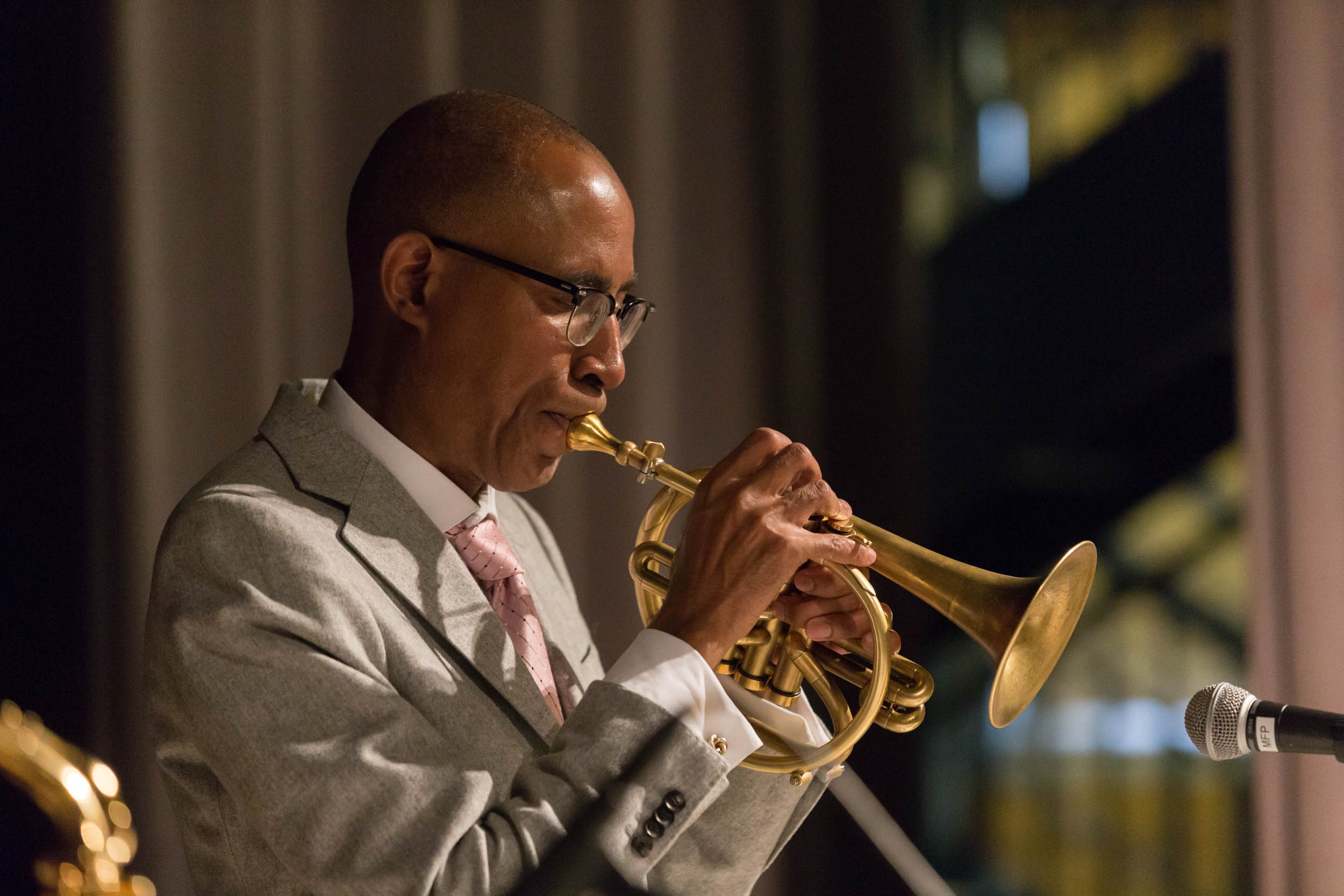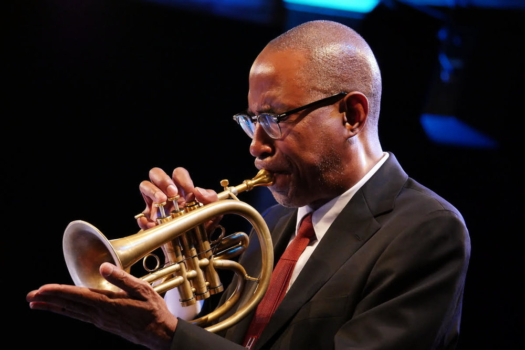Ron was an American jazz trumpeter, cornetist, and composer. A beautiful, beautiful spirit on and off the bandstand. When I was on pregnancy bedrest, the only time I defied my obstetrician’s orders and gallivanted out of the house was for a Ron Miles show. Ron’s wife Kari was hilariously reproachful about this decision. “You came off bedrest for this?” she asked me, gesturing toward her husband onstage. “You have a child to think of now.” In Ron’s family, family always came first.
I was honored when Ron commissioned me to write the liner essay for his 2017 recording, I am a man. Researching and writing music-related book narratives has shown me that over time, the most valuable element in liner essays is comments from the musicians themelves. I believe this so strongly that when I get a request to write a liner note, I usually convince the musician to write it instead, assisting on the editing end. Ron, however, insisted that I write this one. Herein you’ll find plenty of quotes about the I Am A Man recording from Ron, Bill Frisell, and Jason Moran, all of whom I interviewed for the essay.
When Ron Miles teaches Jazz Styles to college students, he likes to open the first day of class with a 1926 quote from Langston Hughes: “We younger Negro artists who create, now intend to express our individual dark-skinned selves without fear or shame . . . We know we are beautiful. And ugly too . . . We build our temples for tomorrow, strong as we know how, and we stand on top of the mountain, free within ourselves.”

It’s a smart way to start, emphasizing jazz’s essential relationship to blackness and to defiant creativity, the latter of which is sure to resonate with young students. Ron Miles also likes to discuss this quote with his peers, because he truly believes that expressing the full complexity of the human condition is the primary work of every artist at every stage of a career.
“That quote gets at the sense that this music and art in general have to embrace everything,” Ron says. “To really go as deep as we can, we have to embrace our failings as well as our success; the beauty of the human condition but also the parts that aren’t so great, because we’re here, and we have to deal with it.”
So when Bill Frisell, Jason Moran, Thomas Morgan, and Brian Blade arrived at Ron’s Denver home to rehearse for this album, their big hugs for Ron mattered. The December snow that hadn’t fallen quite thickly enough to be scenic mattered. The pleasant studio at the back of the brick house whose modesty left money for his children’s education mattered. The musicians’ deep moments of active listening during the session mattered. The seismic upset of the 2016 U.S. presidential election that had come only a month before mattered. The flattened, calloused pads of musicians’ fingers and the bulging veins in their hands mattered. The willingness to travel to Denver and make music with Ron when this record didn’t yet have a home, not knowing what place it would find in the world, mattered. And their obvious joy in the intimacy of musical collaboration mattered.
“Love fuels my work the most,” Ron says. “My love for my fellow musicians. My love for my audience. My love for the tradition that I’m a part of.
This loving embrace of all things great and small, beautiful and ugly—the Non-Hierarchical Aesthetic Gospel of Ron Miles, if you will—likely is a product of his personal history. Ron was born in Indianapolis in 1963 and moved to Denver in 1974 at age 11.
“Growing up here,” he says, “it’s not like there’s tons and tons of black folks around. So everyone in my family had friends from a lot of different places. One sister, I’d go into her bedroom and she’d have Teen Beat and Tiger Beat stuff all over the walls, pictures of Michael Jackson and Sean Cassidy. So I was hearing all this different music all the time and it just all made sense.”
When Ron discovered his affinity and talent for jazz as a teenager, he left pop behind for a time. After earning a music degree at the University of Denver in 1985, he studied the trumpet at the Manhattan School Of Music while taking private lessons from legends like Lester Bowie and Ornette Coleman. His New York stretch coincided with jazz’s 1980s conservative turn, when young musicians were expected to side stylistically and philosophically with either “tradition” or the avant-garde. Ron identified with the progressive faction, and felt most comfortable within it.
After a year in New York City, Ron moved back to Denver and took a teaching job at Metropolitan State University. Having immersed himself in avant-garde jazz, he had to become familiar with the music’s early traditions to teach jazz history, going deep into the work of Jelly Roll Morton and Duke Ellington. His realization that early jazz styles were themselves avant-garde for their time radically challenged then-prevailing categorizations in jazz. My theory: This shake-up of known categories so profoundly affected Ron that it somehow made him receptive to all music, including the pop and roots styles that he’d heard everywhere in his Denver youth. After this awakening, the Partridge Family and Hank Williams, Burt Bacharach and Prince, were All God’s Children in Ron’s musical cosmos.
“When you get into playing music,” Ron says, “that’s where the lines can come down: jazz is this, jazz is not that. If you’re lucky you have a chance to rediscover what and who you really are and become comfortable with that. Once I really admitted who I was and what I liked, music just opened up for me.”

In Ron’s home state of Colorado, you can walk along a foothill ridge and look down on one side to a river feeding a lush green valley, and on the other side to a desert sculpture garden of curious rust-colored rock formations. I hear Ron’s melodies as the high ridges of his music, melodies as backbone and nerve center for his rootsy sounds on one hand and knotty abstractions on the other. Ron’s commitment to lyricism gives him and us a clear and defining perspective on his musical surroundings. His tunefulness keeps his music honest.
“So much contemporary music has a certain intentional difficulty,” Ron says. “Some musicians call it ‘mo-jazz,’ the music with assertively modern stuff like shifting meters. I just write songs, not meters. I write notes and chords, and then I figure out, ‘shoot, that is bar 7 and then bar 4.’ Things can be tricky to play, and that’s fine, but you always want musicians to feel like your song is worthy of the effort.”
“It’s impossible and unnecessary to separate spirituality and politics, and art and politics,” Ron says. “Because we’re in the world that we’re in. From the beginnings of this music, particularly black American music, a sense of triumph over adversity has always been a central part.” For Ron, being in the jazz tradition means making music that speaks to his time. Not necessarily always topical, but relevant. “We’re in some trying times right now, that’s for sure,” he says, referring to America’s political landscape in 2017. “But we’ve seen this before. Culturally, black folks have had to do this over and over again, fighting injustice and finding a positive solution.”
In 1968, a malfunctioning garbage truck crushed and killed two workers in Memphis. With this accident, the ongoing frustrations of black employees over their neglect and abuse flared into righteous outrage. Sanitation workers took to the streets with “I AM A MAN” signs, asserting the fundamental dignity and humanity of workers of every profession. Today, “I Am A Man” carries that specific civil rights history for Ron but has also taken on broader significance. “It’s a claim that we are of a human body,” he says, “a human person, and there are all kinds of ways that we express ourselves.”







More Stories
CD review: George Benson – Dreams Do Come True: When George Benson Meets Robert Farnon – 2024: Video, CD cover
The band was tight as ever. The Warren Haynes Band cuts loose: Video, Photos
Interview with Alvin Queen: Feeling Good – I heard these tunes played by … Video, new CD cover, Photos